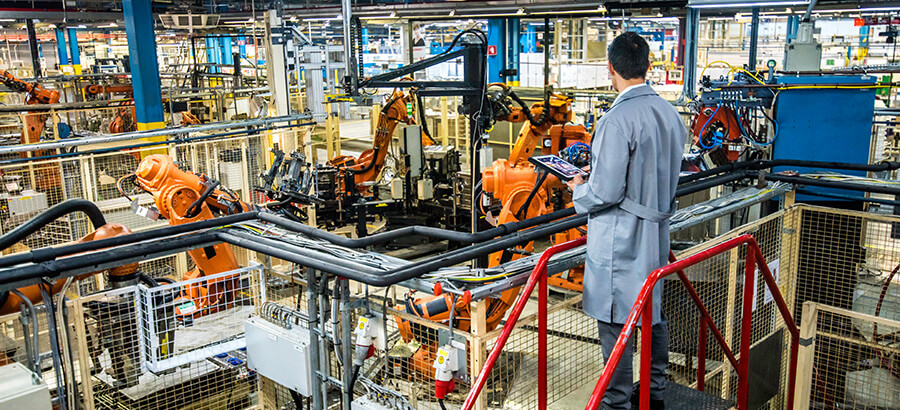There have been many significant developments in the digitization of manufacturing in the past few years. In many first world operations, the use of sensors and IoT devices has had a significant impact on improving visibility and streamlining operations across the supply chain.
Within Africa, the adoption of smart manufacturing technologies and solutions has been far slower. Many African countries are less digitalized than their middle- and high-income counterparts globally, with a technology gap in both access and use. However, there’s no escaping the increasing digitalization of the manufacturing sector. Embracing a digital-first mindset means that we must re-evaluate all our business processes.
Most ERPs still work the same way they did 20 years ago, but technologies like artificial intelligence (AI) and the industrial Internet of Things (IIoT) are changing the parameters of what can be achieved and ushering in a new era of connectedness, collaboration and innovation. This means greater digital dexterity as we use data to gain and maintain a competitive edge, both locally, inter-continentally and globally.
Robotic Process Automation
Robotic Process Automation (RPA) automates rules-based operations to deal with routine administrative tasks and expedite process completion with speed and accuracy, freeing up human capacity to focus on innovation. The use of industrial robots in manufacturing automation is nothing new, but the challenge for manufacturers has been to align back-office processes with the factory floor. RPA software is capable of handling high-volume, repetitive tasks, transferring data across systems, queries, calculations and record maintenance. In doing so, RPA can help manufacturers to focus more on product innovation and core strengths instead of day-to-day repetitive tasks that are critical but mundane in nature. Automation of processes such as inventory management, regulatory compliance and invoice verification helps organizations focus more on improving quality and growth.
Artificial Intelligence
With so much data being produced daily by industrial IoT and smart factories, manufacturers are increasingly turning to AI solutions to better analyze data and make decisions. AI truly has ushered in a new era of connectedness, collaboration and innovation for manufacturers. There are several key benefits to employing AI in manufacturing, including more accurate demand forecasting and less material waste. AI goes hand-in-hand with machine learning and autonomous manufacturing processes, while augmenting supply chain processes with AI can significantly streamline supply chain management.
Big Data and Analytics
It’s been said before, but it bears repeating – without meaningful intelligence generated from proper analytics, data is largely useless. Explosive growth in the volume and different types of data throughout manufacturing and the supply chain means that manufacturers must invest in technology that can intelligently and rapidly analyze data to extract valuable and actionable business insights. Manufacturers need to leverage advanced analytics that allow them to engage in more data-driven decisions around sourcing, production, fulfilment, cost reduction, and other focus areas.
As AI becomes increasingly sophisticated, manufacturers are now also turning to analytics for predictive insights. Predictive analytics helps improve business decision-making by enabling manufacturers to analyze vast amounts of real-time data to identify potential events and opportunities before they happen. This includes predictive maintenance, which can identify small fluctuations in performance that may be early indicators of larger problems. These issues can then be proactively addressed. Equipment downtime is an immediate hit to the bottom line, so this use of predictive analytics enables much more control and planning over downtime, with a resultant cost benefit.
While no one can reliably predict the future, what predictive analytics does offer manufacturers is the capacity to offer much more informed decision-making and avoid or minimize costly downtime. By using big-data tactics and models, predictive analytics can provide a more complete and effective view of forthcoming potential risk factors, opportunities and recommendations for multiple areas across the business.
Customization
Every company and every manufacturer is unique, with different pain points that they need to address – there’s no such thing as one-size-fits-all. A successful ERP system implementation is an integral part of operations, and in many cases, it’s the operational differences within an organisation that determines their competitive advantage. An ERP system that fails to take the needs of the end user into consideration is unlikely to deliver premium results.
This is where customization is the crucial ingredient. The right ERP system allows manufacturers the ability to configure their software to best suit their needs rather than the system dictating how a business should be run. We will increasingly see industry-specific solutions, along with the ability for organizations to tailor their ERP system to their unique business needs and working environment.
Growing the manufacturing sector is often considered a vital factor in realizing inclusive and sustained development. And there is reason for optimism about the state of manufacturing in Africa. Harnessing digital capabilities in the manufacturing sector will undoubtedly further increase the region’s ability to industrialize.






